Exploring Legal, Ethical, and Confidentiality Issues in Mental Health
VerifiedAdded on 2023/06/03
|9
|2413
|361
Report
AI Summary
This report delves into critical legal and ethical considerations within mental health care. It examines informed consent in adult psychiatry, highlighting the importance of voluntarism, competency, and disclosure. The report explores confidentiality concerns, emphasizing patient rights during treatment and recovery, and the rights of carers. The discussion includes the balance between sharing sensitive patient data with carers and adhering to legal and ethical obligations. A case study of Maggie's accident illustrates the practical application of ethical principles, such as non-maleficence and beneficence, in a hospital setting, emphasizing the significance of compassionate care and the importance of continuing support for patients even after recovery. The report provides a comprehensive overview of the complexities involved in providing quality mental health care, while upholding patient rights and ethical standards.

Student’s Name
Affiliate Institution
Date
Affiliate Institution
Date
Paraphrase This Document
Need a fresh take? Get an instant paraphrase of this document with our AI Paraphraser
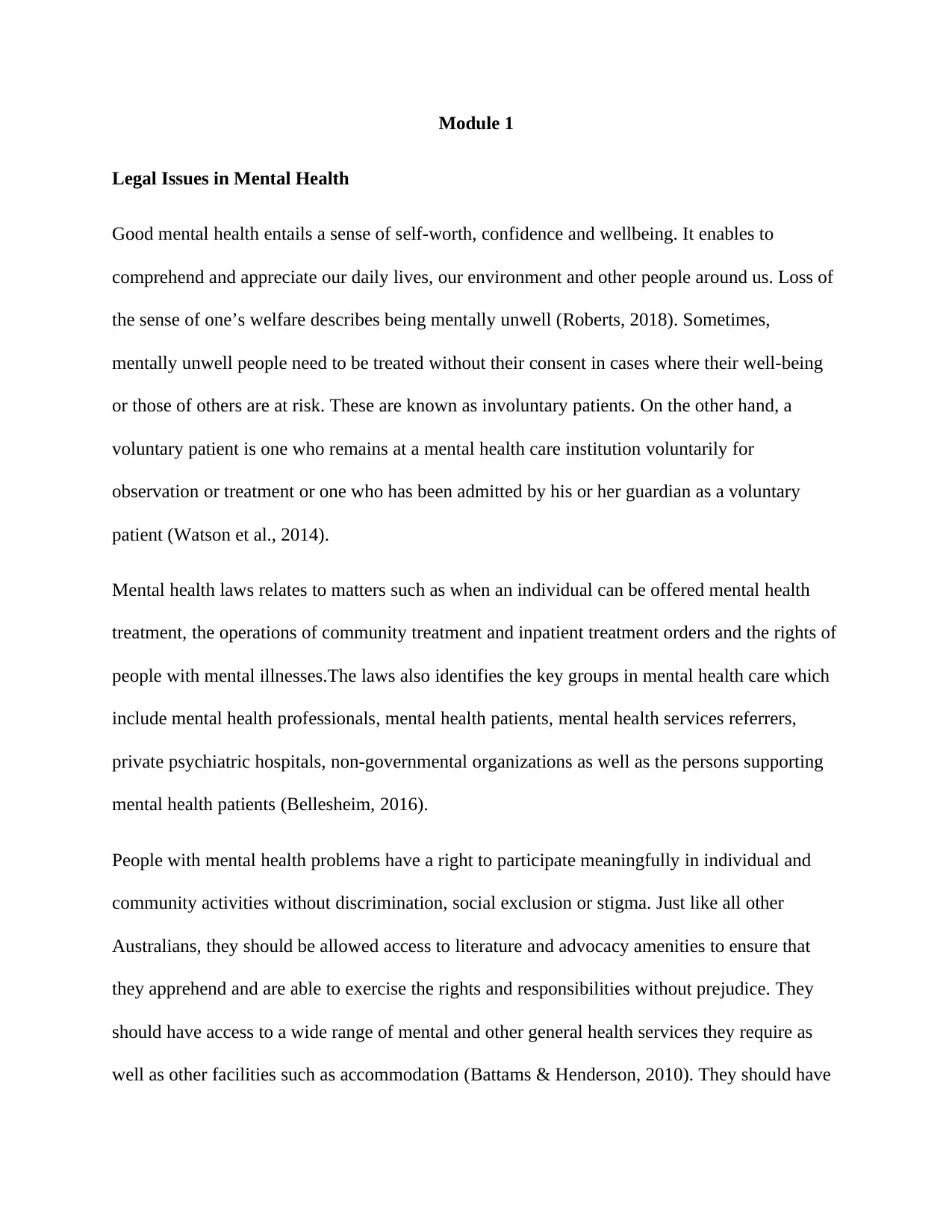
Module 1
Legal Issues in Mental Health
Good mental health entails a sense of self-worth, confidence and wellbeing. It enables to
comprehend and appreciate our daily lives, our environment and other people around us. Loss of
the sense of one’s welfare describes being mentally unwell (Roberts, 2018). Sometimes,
mentally unwell people need to be treated without their consent in cases where their well-being
or those of others are at risk. These are known as involuntary patients. On the other hand, a
voluntary patient is one who remains at a mental health care institution voluntarily for
observation or treatment or one who has been admitted by his or her guardian as a voluntary
patient (Watson et al., 2014).
Mental health laws relates to matters such as when an individual can be offered mental health
treatment, the operations of community treatment and inpatient treatment orders and the rights of
people with mental illnesses.The laws also identifies the key groups in mental health care which
include mental health professionals, mental health patients, mental health services referrers,
private psychiatric hospitals, non-governmental organizations as well as the persons supporting
mental health patients (Bellesheim, 2016).
People with mental health problems have a right to participate meaningfully in individual and
community activities without discrimination, social exclusion or stigma. Just like all other
Australians, they should be allowed access to literature and advocacy amenities to ensure that
they apprehend and are able to exercise the rights and responsibilities without prejudice. They
should have access to a wide range of mental and other general health services they require as
well as other facilities such as accommodation (Battams & Henderson, 2010). They should have
Legal Issues in Mental Health
Good mental health entails a sense of self-worth, confidence and wellbeing. It enables to
comprehend and appreciate our daily lives, our environment and other people around us. Loss of
the sense of one’s welfare describes being mentally unwell (Roberts, 2018). Sometimes,
mentally unwell people need to be treated without their consent in cases where their well-being
or those of others are at risk. These are known as involuntary patients. On the other hand, a
voluntary patient is one who remains at a mental health care institution voluntarily for
observation or treatment or one who has been admitted by his or her guardian as a voluntary
patient (Watson et al., 2014).
Mental health laws relates to matters such as when an individual can be offered mental health
treatment, the operations of community treatment and inpatient treatment orders and the rights of
people with mental illnesses.The laws also identifies the key groups in mental health care which
include mental health professionals, mental health patients, mental health services referrers,
private psychiatric hospitals, non-governmental organizations as well as the persons supporting
mental health patients (Bellesheim, 2016).
People with mental health problems have a right to participate meaningfully in individual and
community activities without discrimination, social exclusion or stigma. Just like all other
Australians, they should be allowed access to literature and advocacy amenities to ensure that
they apprehend and are able to exercise the rights and responsibilities without prejudice. They
should have access to a wide range of mental and other general health services they require as
well as other facilities such as accommodation (Battams & Henderson, 2010). They should have
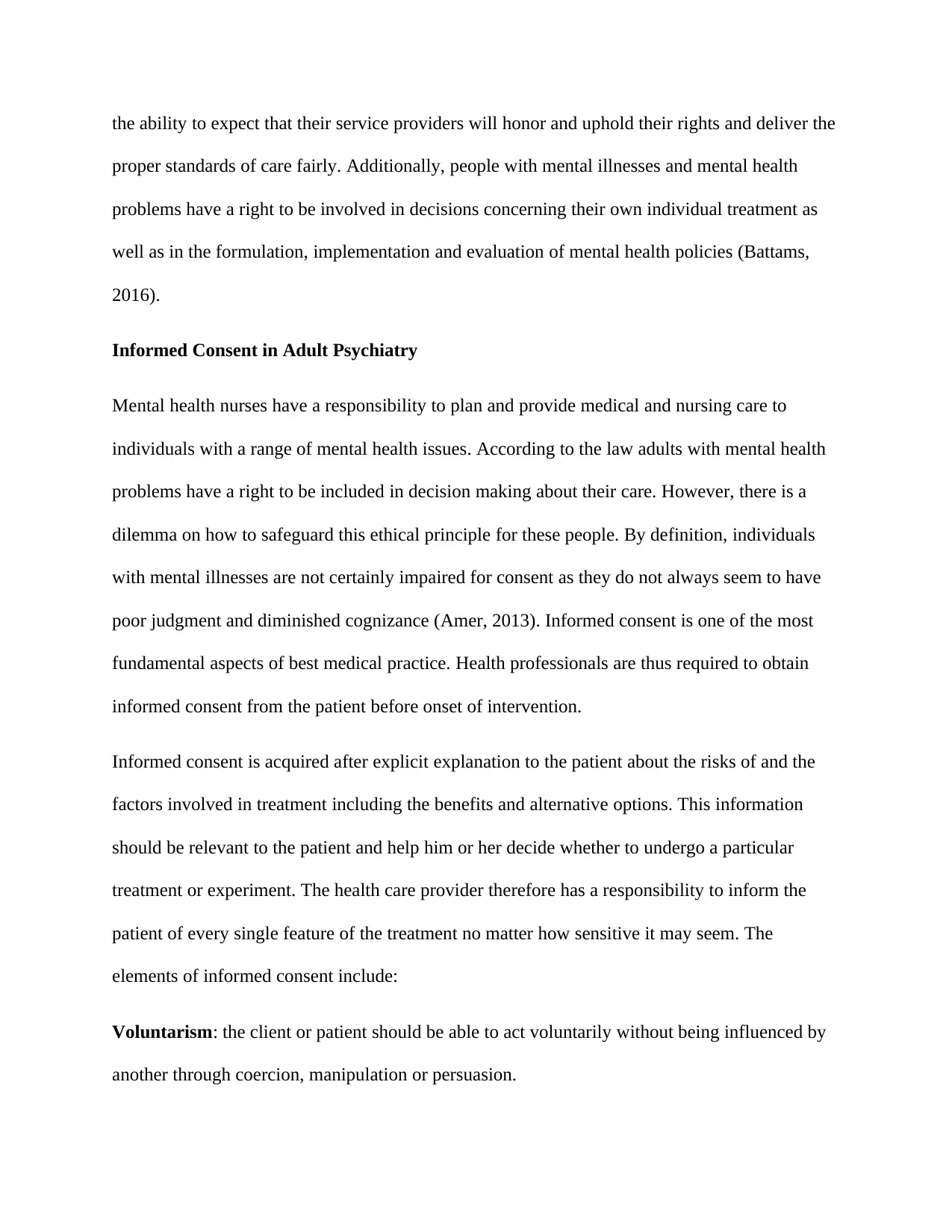
the ability to expect that their service providers will honor and uphold their rights and deliver the
proper standards of care fairly. Additionally, people with mental illnesses and mental health
problems have a right to be involved in decisions concerning their own individual treatment as
well as in the formulation, implementation and evaluation of mental health policies (Battams,
2016).
Informed Consent in Adult Psychiatry
Mental health nurses have a responsibility to plan and provide medical and nursing care to
individuals with a range of mental health issues. According to the law adults with mental health
problems have a right to be included in decision making about their care. However, there is a
dilemma on how to safeguard this ethical principle for these people. By definition, individuals
with mental illnesses are not certainly impaired for consent as they do not always seem to have
poor judgment and diminished cognizance (Amer, 2013). Informed consent is one of the most
fundamental aspects of best medical practice. Health professionals are thus required to obtain
informed consent from the patient before onset of intervention.
Informed consent is acquired after explicit explanation to the patient about the risks of and the
factors involved in treatment including the benefits and alternative options. This information
should be relevant to the patient and help him or her decide whether to undergo a particular
treatment or experiment. The health care provider therefore has a responsibility to inform the
patient of every single feature of the treatment no matter how sensitive it may seem. The
elements of informed consent include:
Voluntarism: the client or patient should be able to act voluntarily without being influenced by
another through coercion, manipulation or persuasion.
proper standards of care fairly. Additionally, people with mental illnesses and mental health
problems have a right to be involved in decisions concerning their own individual treatment as
well as in the formulation, implementation and evaluation of mental health policies (Battams,
2016).
Informed Consent in Adult Psychiatry
Mental health nurses have a responsibility to plan and provide medical and nursing care to
individuals with a range of mental health issues. According to the law adults with mental health
problems have a right to be included in decision making about their care. However, there is a
dilemma on how to safeguard this ethical principle for these people. By definition, individuals
with mental illnesses are not certainly impaired for consent as they do not always seem to have
poor judgment and diminished cognizance (Amer, 2013). Informed consent is one of the most
fundamental aspects of best medical practice. Health professionals are thus required to obtain
informed consent from the patient before onset of intervention.
Informed consent is acquired after explicit explanation to the patient about the risks of and the
factors involved in treatment including the benefits and alternative options. This information
should be relevant to the patient and help him or her decide whether to undergo a particular
treatment or experiment. The health care provider therefore has a responsibility to inform the
patient of every single feature of the treatment no matter how sensitive it may seem. The
elements of informed consent include:
Voluntarism: the client or patient should be able to act voluntarily without being influenced by
another through coercion, manipulation or persuasion.
⊘ This is a preview!⊘
Do you want full access?
Subscribe today to unlock all pages.

Trusted by 1+ million students worldwide
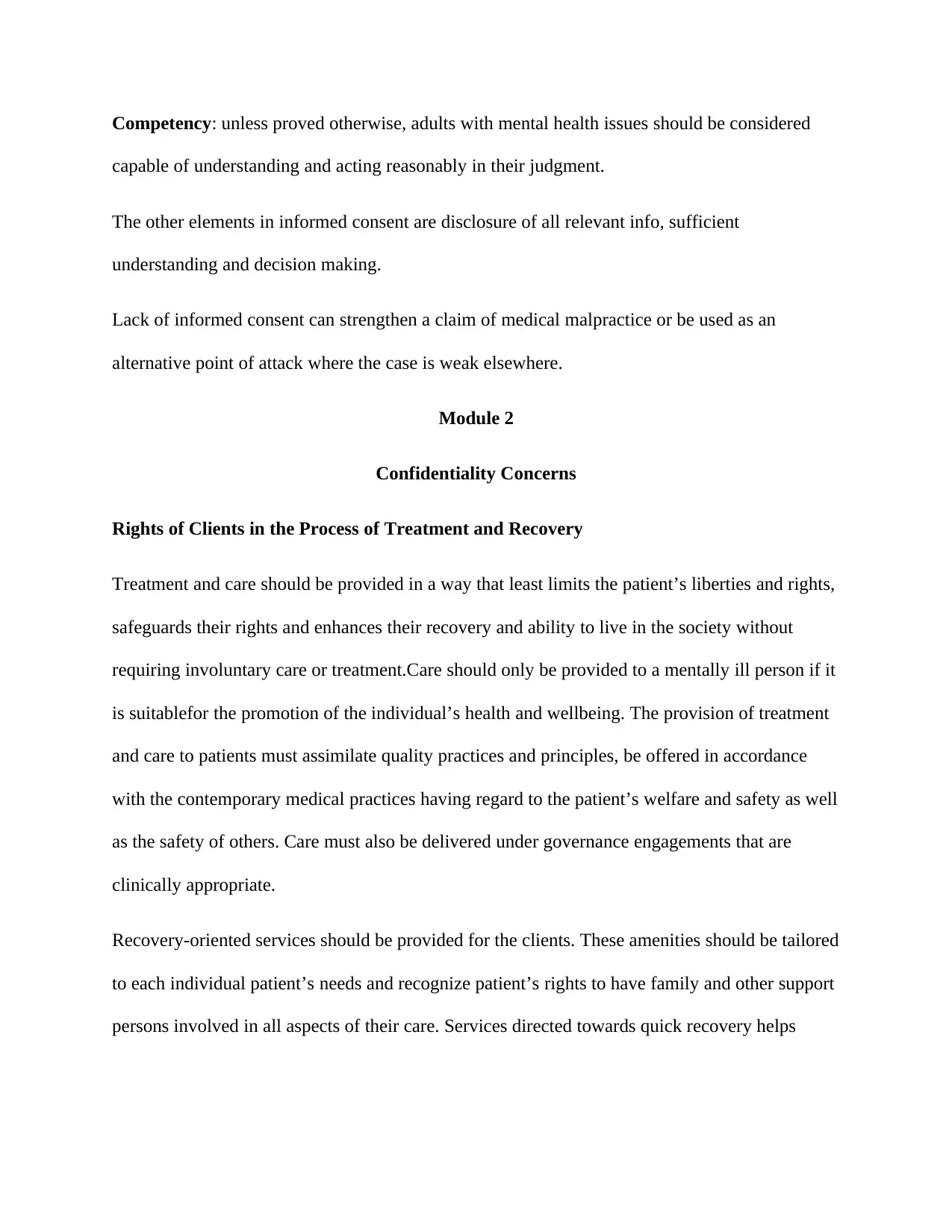
Competency: unless proved otherwise, adults with mental health issues should be considered
capable of understanding and acting reasonably in their judgment.
The other elements in informed consent are disclosure of all relevant info, sufficient
understanding and decision making.
Lack of informed consent can strengthen a claim of medical malpractice or be used as an
alternative point of attack where the case is weak elsewhere.
Module 2
Confidentiality Concerns
Rights of Clients in the Process of Treatment and Recovery
Treatment and care should be provided in a way that least limits the patient’s liberties and rights,
safeguards their rights and enhances their recovery and ability to live in the society without
requiring involuntary care or treatment.Care should only be provided to a mentally ill person if it
is suitablefor the promotion of the individual’s health and wellbeing. The provision of treatment
and care to patients must assimilate quality practices and principles, be offered in accordance
with the contemporary medical practices having regard to the patient’s welfare and safety as well
as the safety of others. Care must also be delivered under governance engagements that are
clinically appropriate.
Recovery-oriented services should be provided for the clients. These amenities should be tailored
to each individual patient’s needs and recognize patient’s rights to have family and other support
persons involved in all aspects of their care. Services directed towards quick recovery helps
capable of understanding and acting reasonably in their judgment.
The other elements in informed consent are disclosure of all relevant info, sufficient
understanding and decision making.
Lack of informed consent can strengthen a claim of medical malpractice or be used as an
alternative point of attack where the case is weak elsewhere.
Module 2
Confidentiality Concerns
Rights of Clients in the Process of Treatment and Recovery
Treatment and care should be provided in a way that least limits the patient’s liberties and rights,
safeguards their rights and enhances their recovery and ability to live in the society without
requiring involuntary care or treatment.Care should only be provided to a mentally ill person if it
is suitablefor the promotion of the individual’s health and wellbeing. The provision of treatment
and care to patients must assimilate quality practices and principles, be offered in accordance
with the contemporary medical practices having regard to the patient’s welfare and safety as well
as the safety of others. Care must also be delivered under governance engagements that are
clinically appropriate.
Recovery-oriented services should be provided for the clients. These amenities should be tailored
to each individual patient’s needs and recognize patient’s rights to have family and other support
persons involved in all aspects of their care. Services directed towards quick recovery helps
Paraphrase This Document
Need a fresh take? Get an instant paraphrase of this document with our AI Paraphraser
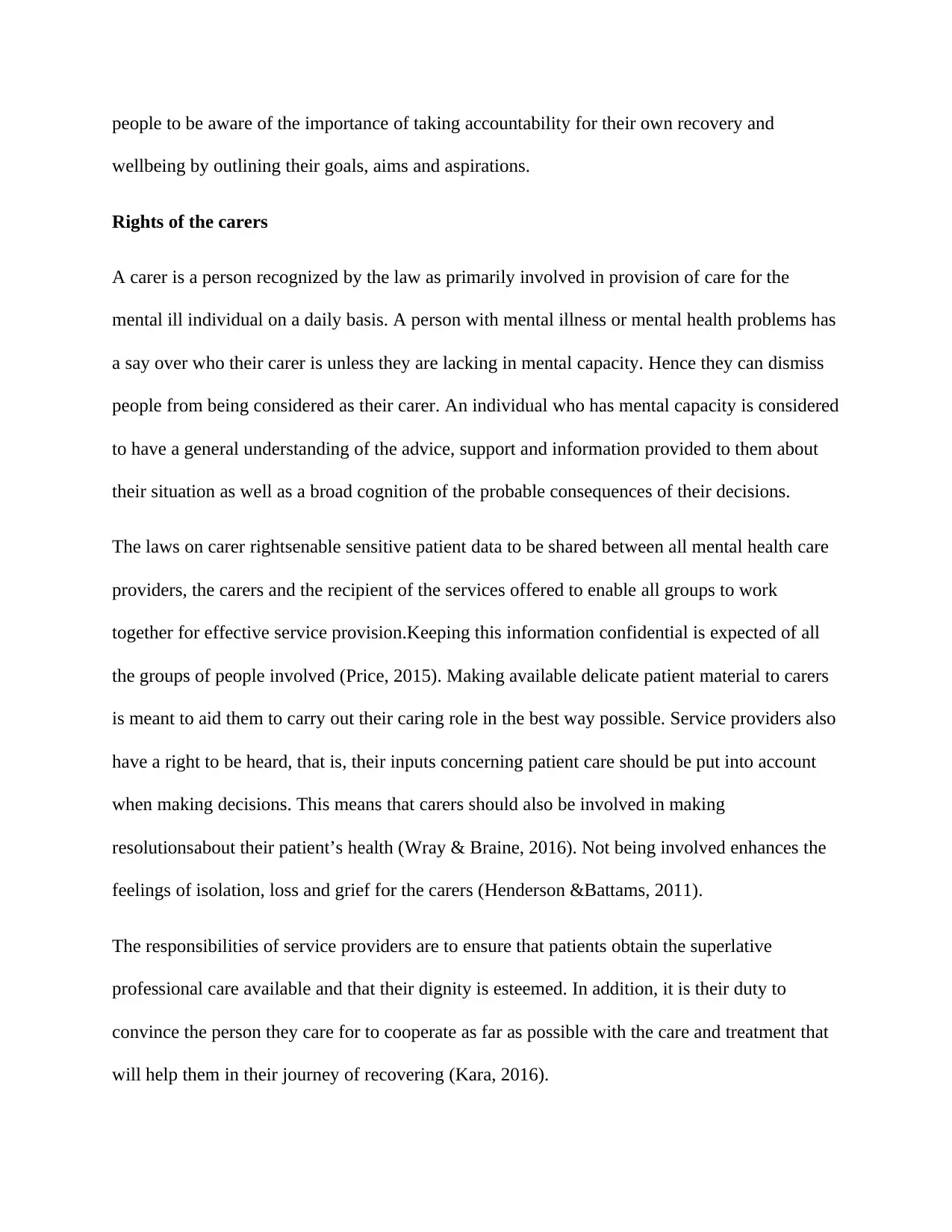
people to be aware of the importance of taking accountability for their own recovery and
wellbeing by outlining their goals, aims and aspirations.
Rights of the carers
A carer is a person recognized by the law as primarily involved in provision of care for the
mental ill individual on a daily basis. A person with mental illness or mental health problems has
a say over who their carer is unless they are lacking in mental capacity. Hence they can dismiss
people from being considered as their carer. An individual who has mental capacity is considered
to have a general understanding of the advice, support and information provided to them about
their situation as well as a broad cognition of the probable consequences of their decisions.
The laws on carer rightsenable sensitive patient data to be shared between all mental health care
providers, the carers and the recipient of the services offered to enable all groups to work
together for effective service provision.Keeping this information confidential is expected of all
the groups of people involved (Price, 2015). Making available delicate patient material to carers
is meant to aid them to carry out their caring role in the best way possible. Service providers also
have a right to be heard, that is, their inputs concerning patient care should be put into account
when making decisions. This means that carers should also be involved in making
resolutionsabout their patient’s health (Wray & Braine, 2016). Not being involved enhances the
feelings of isolation, loss and grief for the carers (Henderson &Battams, 2011).
The responsibilities of service providers are to ensure that patients obtain the superlative
professional care available and that their dignity is esteemed. In addition, it is their duty to
convince the person they care for to cooperate as far as possible with the care and treatment that
will help them in their journey of recovering (Kara, 2016).
wellbeing by outlining their goals, aims and aspirations.
Rights of the carers
A carer is a person recognized by the law as primarily involved in provision of care for the
mental ill individual on a daily basis. A person with mental illness or mental health problems has
a say over who their carer is unless they are lacking in mental capacity. Hence they can dismiss
people from being considered as their carer. An individual who has mental capacity is considered
to have a general understanding of the advice, support and information provided to them about
their situation as well as a broad cognition of the probable consequences of their decisions.
The laws on carer rightsenable sensitive patient data to be shared between all mental health care
providers, the carers and the recipient of the services offered to enable all groups to work
together for effective service provision.Keeping this information confidential is expected of all
the groups of people involved (Price, 2015). Making available delicate patient material to carers
is meant to aid them to carry out their caring role in the best way possible. Service providers also
have a right to be heard, that is, their inputs concerning patient care should be put into account
when making decisions. This means that carers should also be involved in making
resolutionsabout their patient’s health (Wray & Braine, 2016). Not being involved enhances the
feelings of isolation, loss and grief for the carers (Henderson &Battams, 2011).
The responsibilities of service providers are to ensure that patients obtain the superlative
professional care available and that their dignity is esteemed. In addition, it is their duty to
convince the person they care for to cooperate as far as possible with the care and treatment that
will help them in their journey of recovering (Kara, 2016).
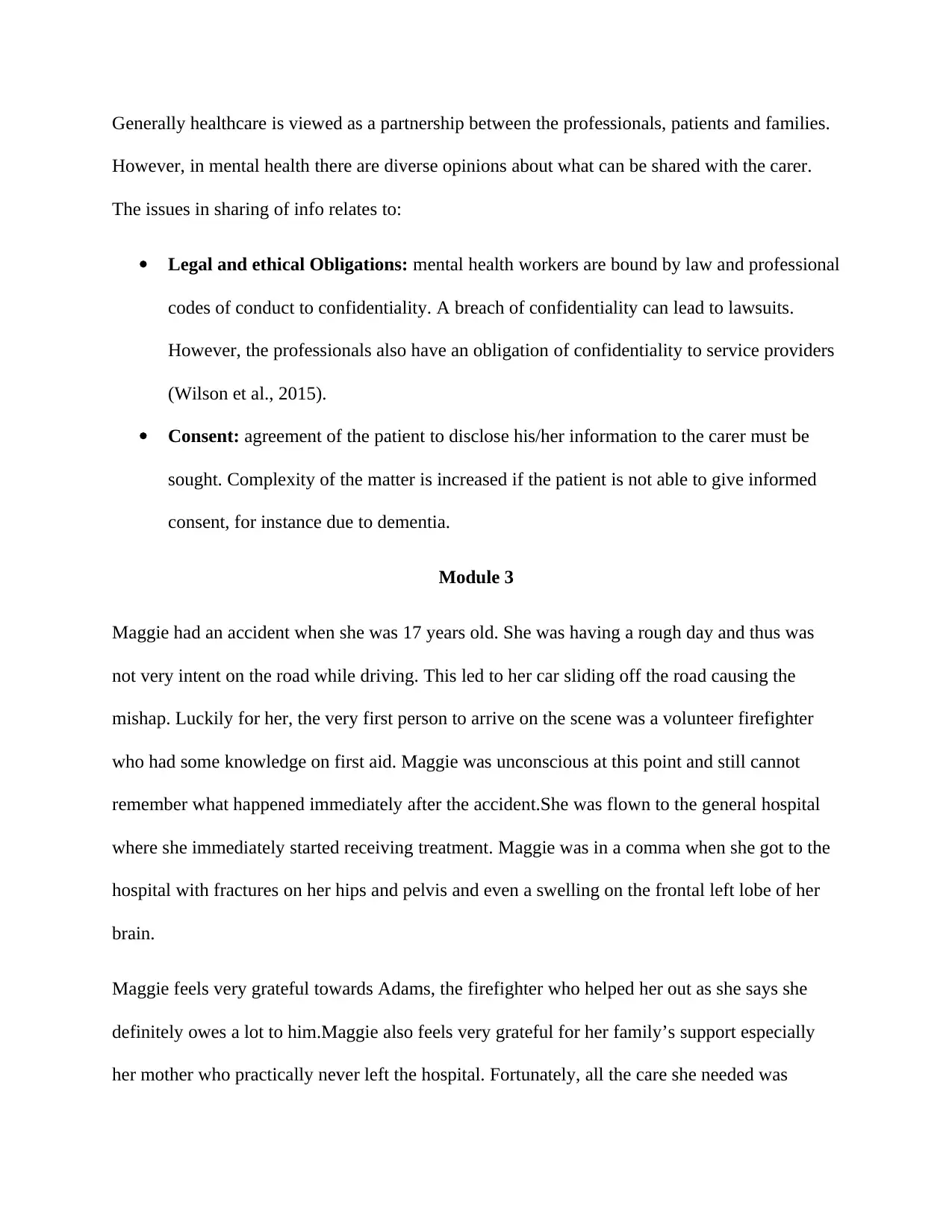
Generally healthcare is viewed as a partnership between the professionals, patients and families.
However, in mental health there are diverse opinions about what can be shared with the carer.
The issues in sharing of info relates to:
Legal and ethical Obligations: mental health workers are bound by law and professional
codes of conduct to confidentiality. A breach of confidentiality can lead to lawsuits.
However, the professionals also have an obligation of confidentiality to service providers
(Wilson et al., 2015).
Consent: agreement of the patient to disclose his/her information to the carer must be
sought. Complexity of the matter is increased if the patient is not able to give informed
consent, for instance due to dementia.
Module 3
Maggie had an accident when she was 17 years old. She was having a rough day and thus was
not very intent on the road while driving. This led to her car sliding off the road causing the
mishap. Luckily for her, the very first person to arrive on the scene was a volunteer firefighter
who had some knowledge on first aid. Maggie was unconscious at this point and still cannot
remember what happened immediately after the accident.She was flown to the general hospital
where she immediately started receiving treatment. Maggie was in a comma when she got to the
hospital with fractures on her hips and pelvis and even a swelling on the frontal left lobe of her
brain.
Maggie feels very grateful towards Adams, the firefighter who helped her out as she says she
definitely owes a lot to him.Maggie also feels very grateful for her family’s support especially
her mother who practically never left the hospital. Fortunately, all the care she needed was
However, in mental health there are diverse opinions about what can be shared with the carer.
The issues in sharing of info relates to:
Legal and ethical Obligations: mental health workers are bound by law and professional
codes of conduct to confidentiality. A breach of confidentiality can lead to lawsuits.
However, the professionals also have an obligation of confidentiality to service providers
(Wilson et al., 2015).
Consent: agreement of the patient to disclose his/her information to the carer must be
sought. Complexity of the matter is increased if the patient is not able to give informed
consent, for instance due to dementia.
Module 3
Maggie had an accident when she was 17 years old. She was having a rough day and thus was
not very intent on the road while driving. This led to her car sliding off the road causing the
mishap. Luckily for her, the very first person to arrive on the scene was a volunteer firefighter
who had some knowledge on first aid. Maggie was unconscious at this point and still cannot
remember what happened immediately after the accident.She was flown to the general hospital
where she immediately started receiving treatment. Maggie was in a comma when she got to the
hospital with fractures on her hips and pelvis and even a swelling on the frontal left lobe of her
brain.
Maggie feels very grateful towards Adams, the firefighter who helped her out as she says she
definitely owes a lot to him.Maggie also feels very grateful for her family’s support especially
her mother who practically never left the hospital. Fortunately, all the care she needed was
⊘ This is a preview!⊘
Do you want full access?
Subscribe today to unlock all pages.

Trusted by 1+ million students worldwide
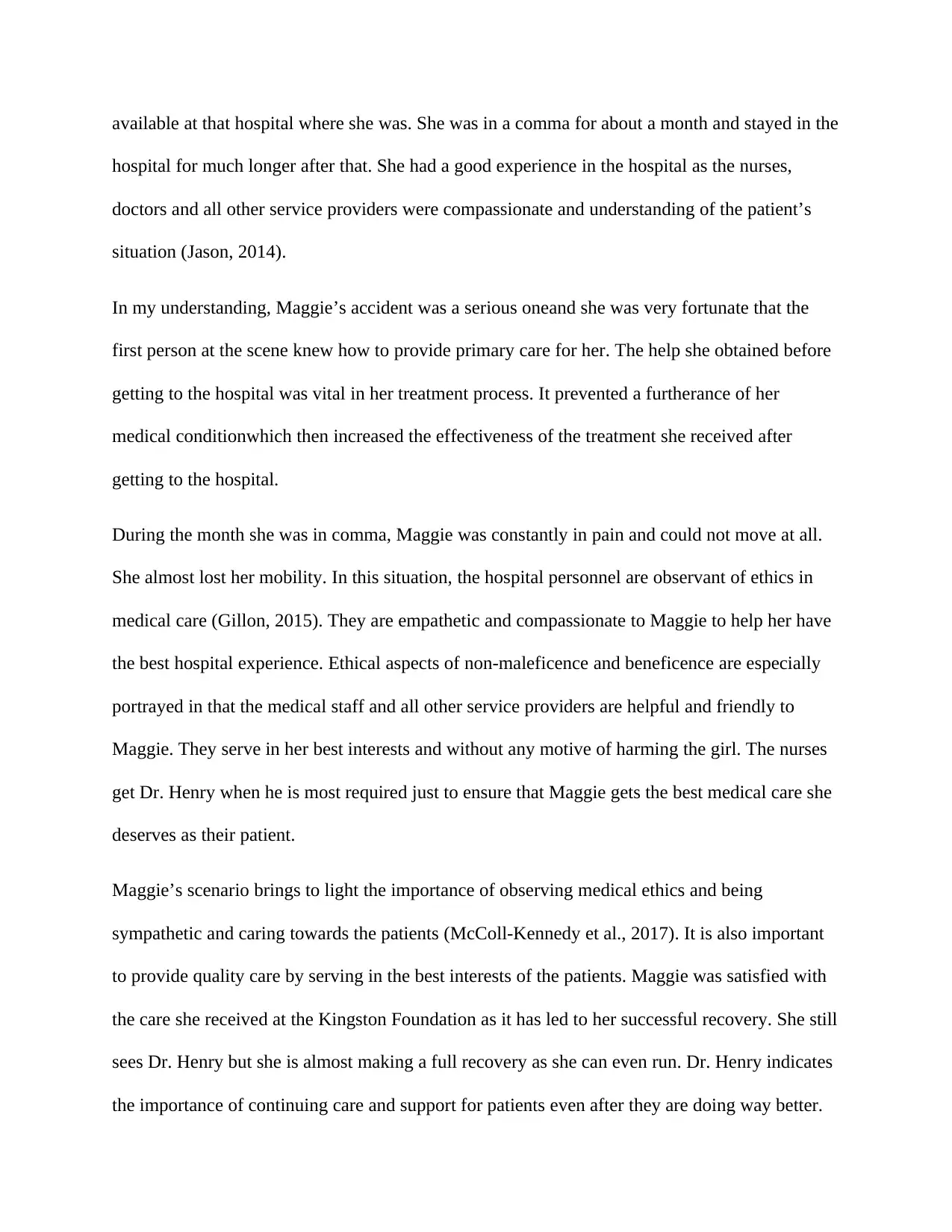
available at that hospital where she was. She was in a comma for about a month and stayed in the
hospital for much longer after that. She had a good experience in the hospital as the nurses,
doctors and all other service providers were compassionate and understanding of the patient’s
situation (Jason, 2014).
In my understanding, Maggie’s accident was a serious oneand she was very fortunate that the
first person at the scene knew how to provide primary care for her. The help she obtained before
getting to the hospital was vital in her treatment process. It prevented a furtherance of her
medical conditionwhich then increased the effectiveness of the treatment she received after
getting to the hospital.
During the month she was in comma, Maggie was constantly in pain and could not move at all.
She almost lost her mobility. In this situation, the hospital personnel are observant of ethics in
medical care (Gillon, 2015). They are empathetic and compassionate to Maggie to help her have
the best hospital experience. Ethical aspects of non-maleficence and beneficence are especially
portrayed in that the medical staff and all other service providers are helpful and friendly to
Maggie. They serve in her best interests and without any motive of harming the girl. The nurses
get Dr. Henry when he is most required just to ensure that Maggie gets the best medical care she
deserves as their patient.
Maggie’s scenario brings to light the importance of observing medical ethics and being
sympathetic and caring towards the patients (McColl-Kennedy et al., 2017). It is also important
to provide quality care by serving in the best interests of the patients. Maggie was satisfied with
the care she received at the Kingston Foundation as it has led to her successful recovery. She still
sees Dr. Henry but she is almost making a full recovery as she can even run. Dr. Henry indicates
the importance of continuing care and support for patients even after they are doing way better.
hospital for much longer after that. She had a good experience in the hospital as the nurses,
doctors and all other service providers were compassionate and understanding of the patient’s
situation (Jason, 2014).
In my understanding, Maggie’s accident was a serious oneand she was very fortunate that the
first person at the scene knew how to provide primary care for her. The help she obtained before
getting to the hospital was vital in her treatment process. It prevented a furtherance of her
medical conditionwhich then increased the effectiveness of the treatment she received after
getting to the hospital.
During the month she was in comma, Maggie was constantly in pain and could not move at all.
She almost lost her mobility. In this situation, the hospital personnel are observant of ethics in
medical care (Gillon, 2015). They are empathetic and compassionate to Maggie to help her have
the best hospital experience. Ethical aspects of non-maleficence and beneficence are especially
portrayed in that the medical staff and all other service providers are helpful and friendly to
Maggie. They serve in her best interests and without any motive of harming the girl. The nurses
get Dr. Henry when he is most required just to ensure that Maggie gets the best medical care she
deserves as their patient.
Maggie’s scenario brings to light the importance of observing medical ethics and being
sympathetic and caring towards the patients (McColl-Kennedy et al., 2017). It is also important
to provide quality care by serving in the best interests of the patients. Maggie was satisfied with
the care she received at the Kingston Foundation as it has led to her successful recovery. She still
sees Dr. Henry but she is almost making a full recovery as she can even run. Dr. Henry indicates
the importance of continuing care and support for patients even after they are doing way better.
Paraphrase This Document
Need a fresh take? Get an instant paraphrase of this document with our AI Paraphraser
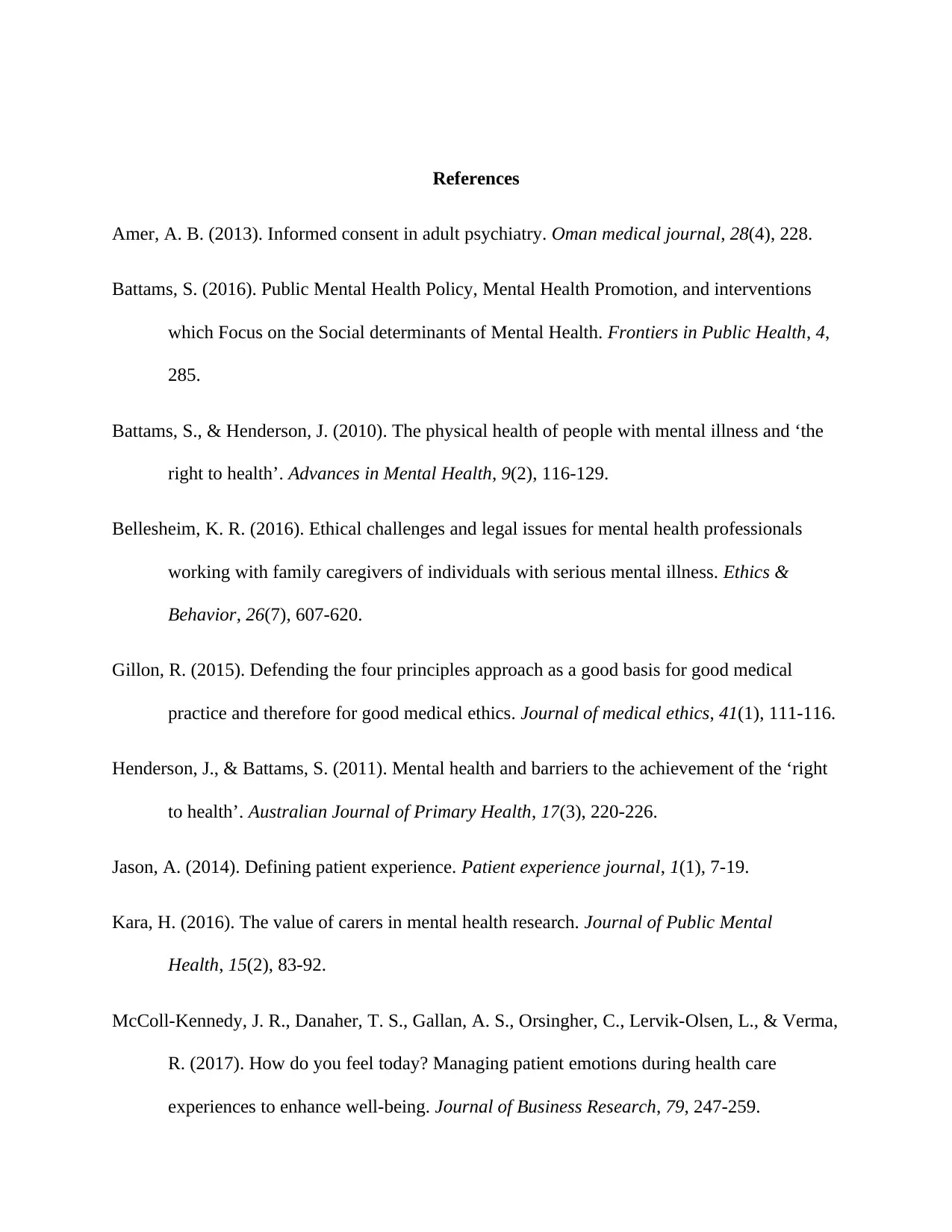
References
Amer, A. B. (2013). Informed consent in adult psychiatry. Oman medical journal, 28(4), 228.
Battams, S. (2016). Public Mental Health Policy, Mental Health Promotion, and interventions
which Focus on the Social determinants of Mental Health. Frontiers in Public Health, 4,
285.
Battams, S., & Henderson, J. (2010). The physical health of people with mental illness and ‘the
right to health’. Advances in Mental Health, 9(2), 116-129.
Bellesheim, K. R. (2016). Ethical challenges and legal issues for mental health professionals
working with family caregivers of individuals with serious mental illness. Ethics &
Behavior, 26(7), 607-620.
Gillon, R. (2015). Defending the four principles approach as a good basis for good medical
practice and therefore for good medical ethics. Journal of medical ethics, 41(1), 111-116.
Henderson, J., & Battams, S. (2011). Mental health and barriers to the achievement of the ‘right
to health’. Australian Journal of Primary Health, 17(3), 220-226.
Jason, A. (2014). Defining patient experience. Patient experience journal, 1(1), 7-19.
Kara, H. (2016). The value of carers in mental health research. Journal of Public Mental
Health, 15(2), 83-92.
McColl-Kennedy, J. R., Danaher, T. S., Gallan, A. S., Orsingher, C., Lervik-Olsen, L., & Verma,
R. (2017). How do you feel today? Managing patient emotions during health care
experiences to enhance well-being. Journal of Business Research, 79, 247-259.
Amer, A. B. (2013). Informed consent in adult psychiatry. Oman medical journal, 28(4), 228.
Battams, S. (2016). Public Mental Health Policy, Mental Health Promotion, and interventions
which Focus on the Social determinants of Mental Health. Frontiers in Public Health, 4,
285.
Battams, S., & Henderson, J. (2010). The physical health of people with mental illness and ‘the
right to health’. Advances in Mental Health, 9(2), 116-129.
Bellesheim, K. R. (2016). Ethical challenges and legal issues for mental health professionals
working with family caregivers of individuals with serious mental illness. Ethics &
Behavior, 26(7), 607-620.
Gillon, R. (2015). Defending the four principles approach as a good basis for good medical
practice and therefore for good medical ethics. Journal of medical ethics, 41(1), 111-116.
Henderson, J., & Battams, S. (2011). Mental health and barriers to the achievement of the ‘right
to health’. Australian Journal of Primary Health, 17(3), 220-226.
Jason, A. (2014). Defining patient experience. Patient experience journal, 1(1), 7-19.
Kara, H. (2016). The value of carers in mental health research. Journal of Public Mental
Health, 15(2), 83-92.
McColl-Kennedy, J. R., Danaher, T. S., Gallan, A. S., Orsingher, C., Lervik-Olsen, L., & Verma,
R. (2017). How do you feel today? Managing patient emotions during health care
experiences to enhance well-being. Journal of Business Research, 79, 247-259.
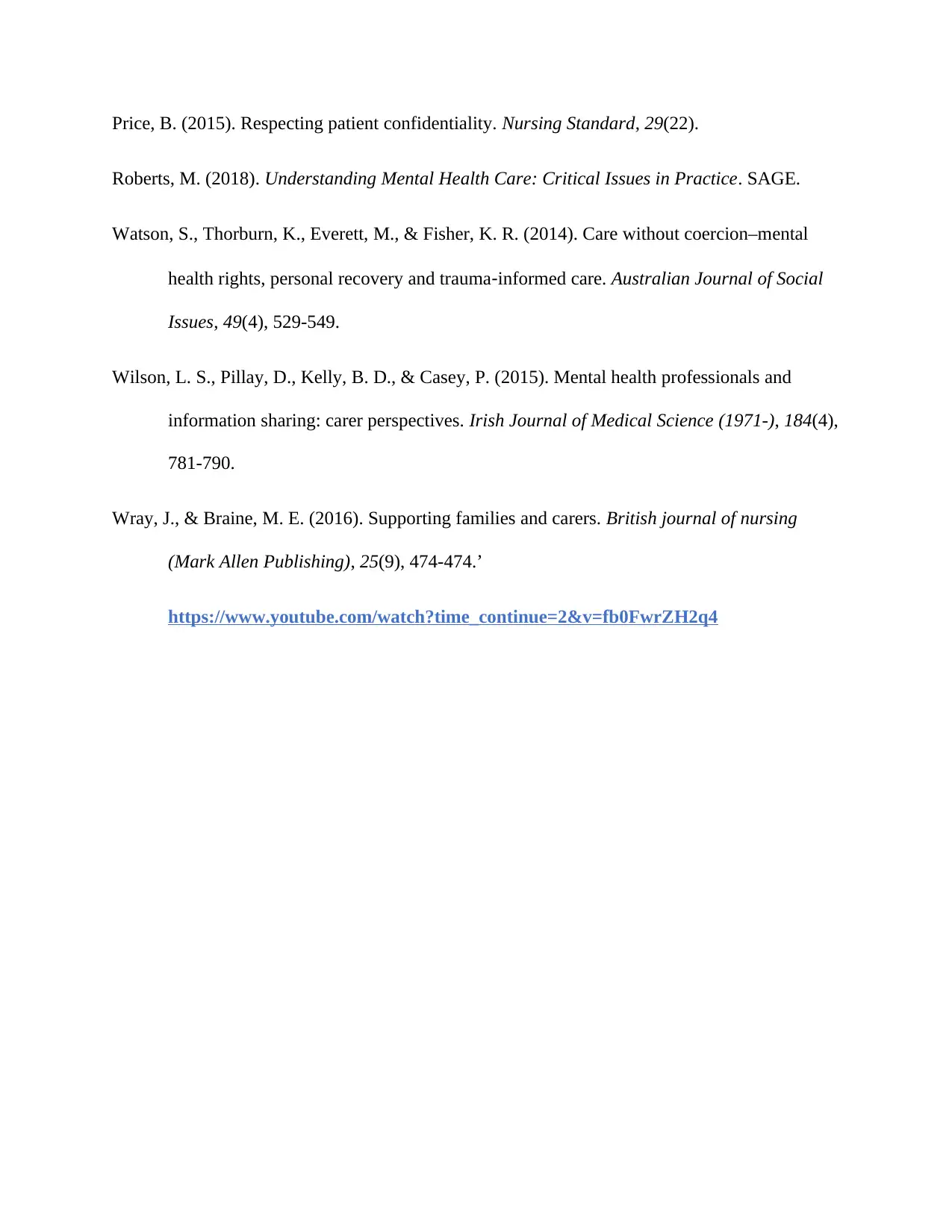
Price, B. (2015). Respecting patient confidentiality. Nursing Standard, 29(22).
Roberts, M. (2018). Understanding Mental Health Care: Critical Issues in Practice. SAGE.
Watson, S., Thorburn, K., Everett, M., & Fisher, K. R. (2014). Care without coercion–mental
health rights, personal recovery and trauma‐informed care. Australian Journal of Social
Issues, 49(4), 529-549.
Wilson, L. S., Pillay, D., Kelly, B. D., & Casey, P. (2015). Mental health professionals and
information sharing: carer perspectives. Irish Journal of Medical Science (1971-), 184(4),
781-790.
Wray, J., & Braine, M. E. (2016). Supporting families and carers. British journal of nursing
(Mark Allen Publishing), 25(9), 474-474.’
https://www.youtube.com/watch?time_continue=2&v=fb0FwrZH2q4
Roberts, M. (2018). Understanding Mental Health Care: Critical Issues in Practice. SAGE.
Watson, S., Thorburn, K., Everett, M., & Fisher, K. R. (2014). Care without coercion–mental
health rights, personal recovery and trauma‐informed care. Australian Journal of Social
Issues, 49(4), 529-549.
Wilson, L. S., Pillay, D., Kelly, B. D., & Casey, P. (2015). Mental health professionals and
information sharing: carer perspectives. Irish Journal of Medical Science (1971-), 184(4),
781-790.
Wray, J., & Braine, M. E. (2016). Supporting families and carers. British journal of nursing
(Mark Allen Publishing), 25(9), 474-474.’
https://www.youtube.com/watch?time_continue=2&v=fb0FwrZH2q4
⊘ This is a preview!⊘
Do you want full access?
Subscribe today to unlock all pages.

Trusted by 1+ million students worldwide
1 out of 9
Related Documents
Your All-in-One AI-Powered Toolkit for Academic Success.
+13062052269
info@desklib.com
Available 24*7 on WhatsApp / Email
![[object Object]](/_next/static/media/star-bottom.7253800d.svg)
Unlock your academic potential
Copyright © 2020–2026 A2Z Services. All Rights Reserved. Developed and managed by ZUCOL.





